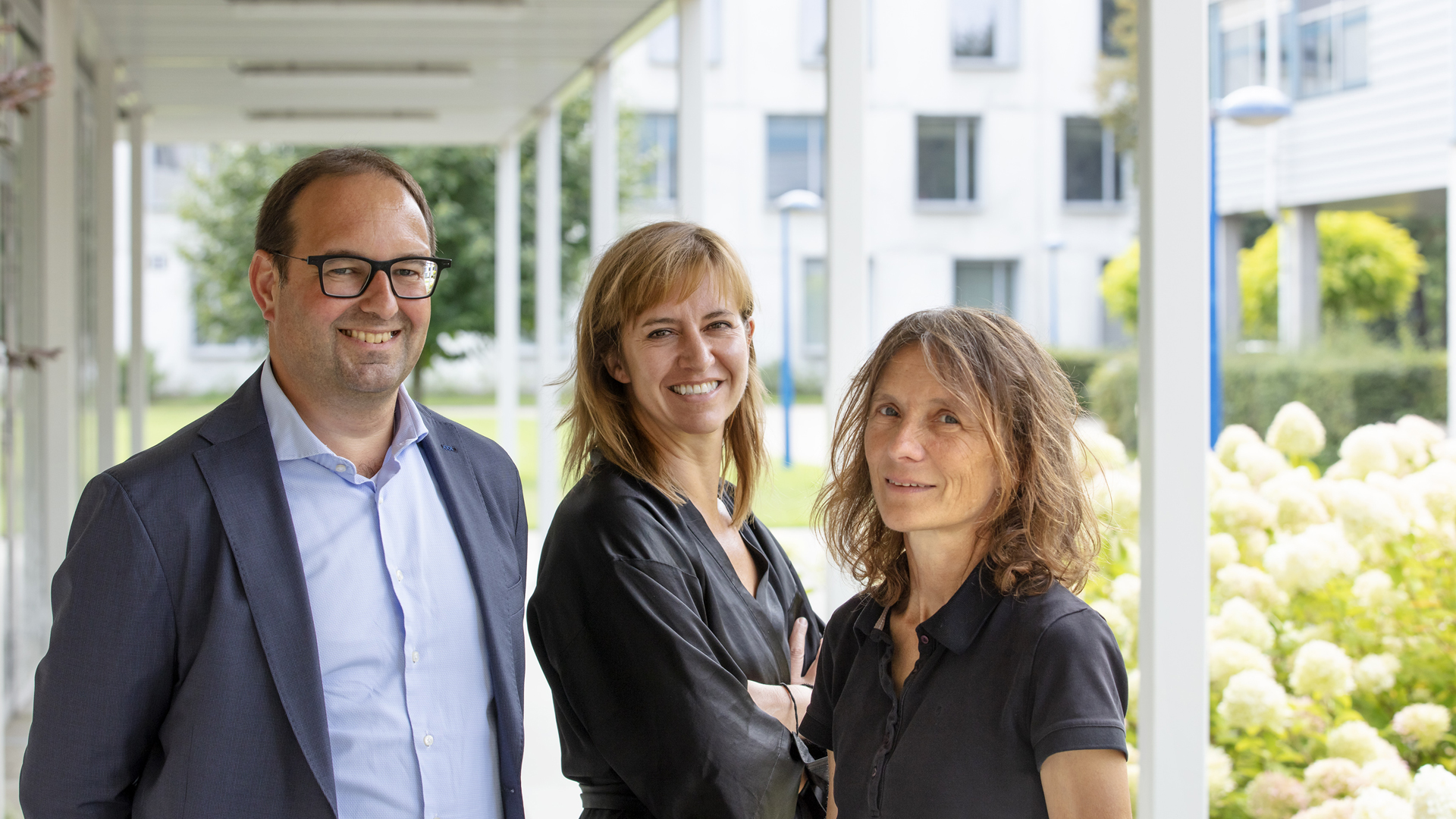How do you create societal or economic added value with research? ‘More and more researchers are thinking about valorisation, but do not know how to go about this. That is what we are here for.’ Kris Asnong of Antwerp Valorisation & Development, Jurgen Joossens of the Valorisation Office and Professor Silvia Lenaerts, Vice-Rector for Valorisation, explain why and especially how our university wants to stimulate valorisation.
The time when university or university college researchers mainly dreamed of publications and recognition within academia seems to be over. More and more scientists want to see their knowledge and expertise translated into societal or economic added value.
‘All over the world, universities are starting to pay more attention to valorisation’, says Professor Silvia Lenaerts, Vice-Rector for Innovation and Valorisation. ‘Recently, the European Innovation Council (EIC) was established, which provides funding for cooperation between universities, governments, and businesses. If a university still wants to be around in ten years’ time, then these new EU resources offer great opportunities for growth. At the University of Antwerp, we have the wonderful opportunity of drawing on our regional strengths to participate at a European level. We want our excellent research to have more impact.’
The COVID-19 pandemic once again highlighted the importance of establishing partnerships inside and outside the university. ‘As a society, we are increasingly seeing complex problems that require swift solutions’, says Kris. ‘For such problems, it is important to bring together expertise and knowledge from multiple disciplines. More than ever can the university play a central role in this.’
More than financial return
Valorisation is a two-way street: sometimes the scientists themselves look for applications of their research; sometimes a company or other organisation with a specific challenge comes knocking at the university’s door. ‘At that point, we can often provide an answer with our extensive research facilities and expertise’, says Jurgen. The fact that additional resources are attracted to the university is another important incentive of valorisation. ‘Valorisation is about much more than financial return, but we cannot ignore the fact that revenue is playing an increasingly important role’, notes Kris.
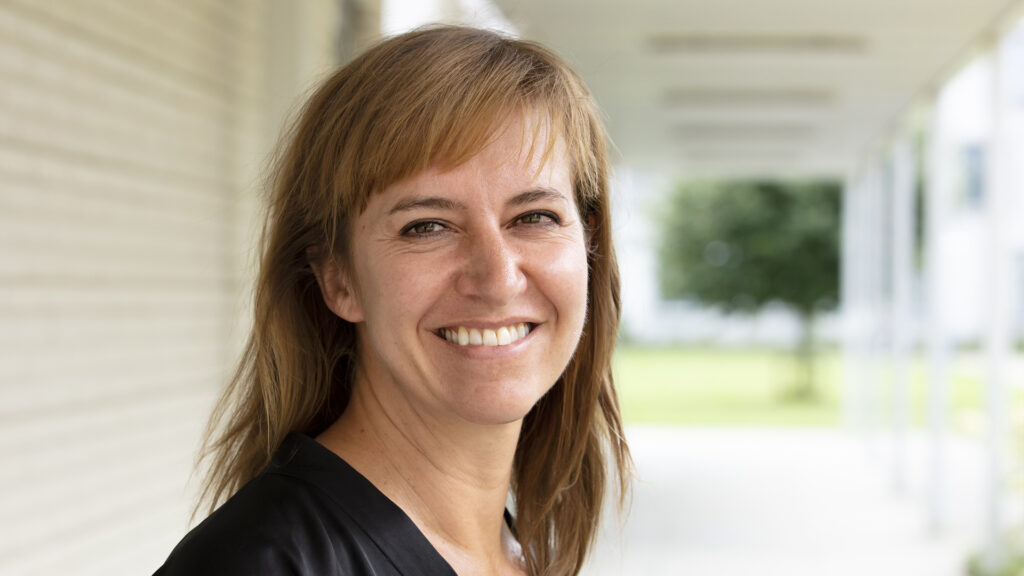
Silvia: ‘We see valorisation as any added value on a societal or economic level. It can also be about inclusiveness, health or the environment, for example.’ Jurgen adds that it is not just about the technology either. ‘Humanities and social sciences also have an important role to play. They can, for example, help us think about the consequences of this new technology for citizens and society.’
In practice, the step towards valorisation is often quite large. Researchers are faced with many questions and obstacles. How do I find a company that wants to work with me? How do I obtain funding? How do I get in touch with other researchers within the same domain? How do I start a spin-off? ‘The fact that valorisation is often difficult has everything to do with the required knowledge and skills that are not available during academic studies. Marketing, ICT, product development, drawing up a financial plan, market research, etc.: most of our students do not learn these skills. It is up to us to provide more support in this’, says Silvia.
Innovation hubs for more interaction
In recent years, our university has stepped up a notch when it comes to valorisation. As a first step, three priority valorisation domains were defined: metropolitanism and smart city, mobility and logistics, sustainable chemistry, materials and infectious diseases and environmental health. ‘Of course, we also support other areas of research, but it is important that, as a university, we decide on a number of priority areas’, Silvia adds.
What was also very important, was the creation of open innovation hubs such as The Beacon, BlueApp and Vaccinopolis. Jurgen: ‘Such incubators facilitate contact and cooperation between the various actors inside and outside academia. It helps if you meet at the coffee machine, so to speak.’
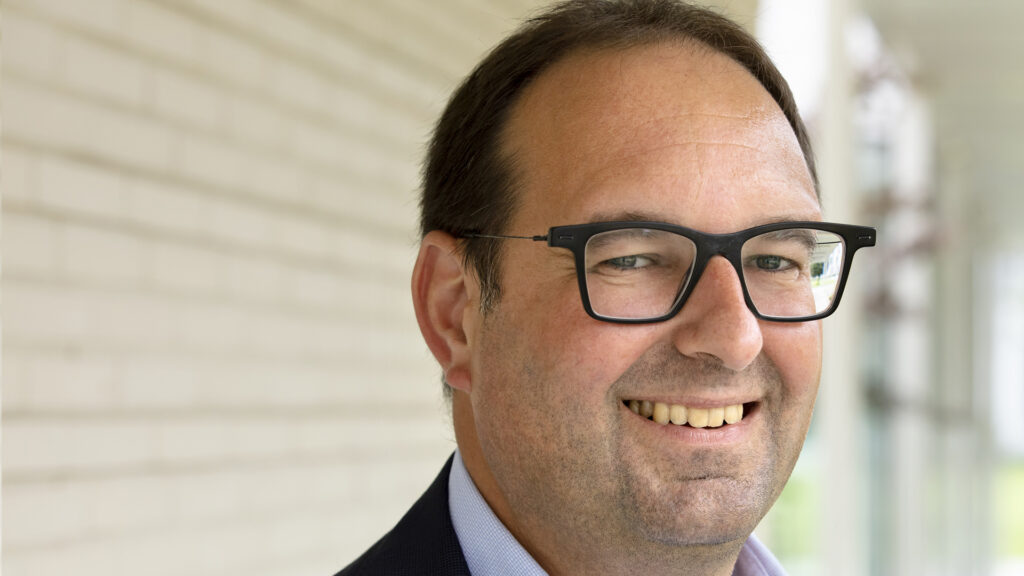
The release of budgets and the appointment of Silvia as Vice-Rector for Valorisation in 2016 prove that these were not just words. The range of study programmes was also expanded. And there was the launch of the AHA! award, an initiative of our university and Voka Antwerpen-Waasland, to put the spotlight on researchers with impactful and promising valorisation projects. ‘We presented this award for the first time during the Antwerp Innovation Night in 2019. That evening, we honoured Professor Pierre Van Damme in the achievedcategory as a vaccine specialist and awarded the promising award to Internet of Things expert, Professor Steve Latré. Two years later, we can only conclude that we chose the right people’, says Silvia. Kris believes that researchers need such success stories. ‘I am convinced that they inspire new success stories.’ The second Antwerp Innovation Night will take place in December.
Antwerp Valorisation & Development
Another milestone was the creation of the Antwerp Valorisation & Development (AVD) business unit in 2020 to complement the existing Valorisation Office. Jurgen: ‘The Valorisation Office has traditionally focused more on technical aspects, such as the development of spin-offs, licensing of intellectual property, market analysis, etc. But valorisation has gradually become much broader: it is also about ecosystem thinking and generating societal impact. This opens up more opportunities, but also means more work. The establishment of AVD gives us more room to manoeuvre.’
AVD deals with strategic files and also wants to create a favourable environment for valorisation. Kris: ‘We are experimenting with various ways of doing valorisation. What do researchers and businesses need? What are the obstacles and how can we remove them?’ Nevertheless, she sees the Valorisation Office and AVD first and foremost as a team. This is also the message that Silvia wants to convey: ‘It’s not about individual boxes: it’s about people. When staff members ask me which valorisation manager to go to, I recommend going to the person who is closest to their research.’ Each valorisation file has its own character and is highly individual, as Kris knows. ‘As a researcher, do not expect to find a ready-made route. We will work with you to find out who is best suited to help you.’
‘We see the enthusiasm growing’
That all these efforts are paying off is evident from the rising number of patents and spin-offs in recent years and the increased income from the industry. ‘With our patent portfolio, we have achieved a commercialisation rate of 23 per cent. We are speaking of licences, options, or transfers. That is quite high. It is our ambition to, in time, reach 50 per cent’, notes Jurgen. He has found that companies and investors nowadays consider UAntwerp as a fully-fledged partner for valorisation. Kris also sees a new mentality emerging among many researchers within our university. ‘You can feel the enthusiasm growing. When we talk to researchers about cooperation with cutting-edge expertise or technology, I see their eyes twinkle. However, they often lack know-how or time. It is up to us to provide the right facilities.’
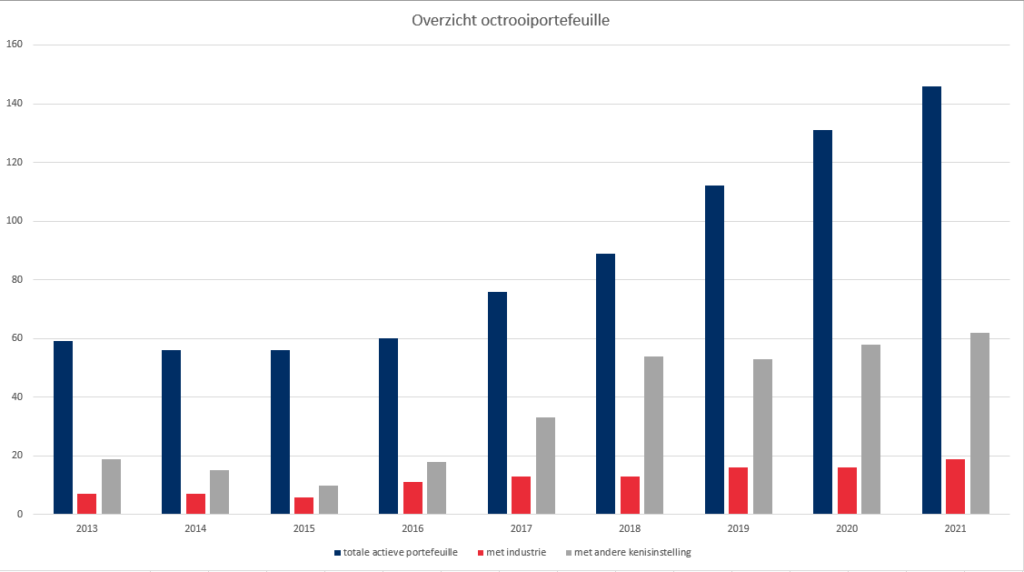
Lowering the threshold for valorisation remains an important point of attention. Silvia advocates more support: not only centrally, but also in the faculties, close to the researchers. She is thinking of providing external coaches and mentors who can support them in domains they are not familiar with. This would also relieve the burden from the much sought-after central and domain valorisation managers. In addition, she wants to bring in more people to bridge the gap between the university and the business world. ‘I am thinking not only of valorisation managers, but also of business developers who know both the companies and the university well.’ Jurgen agrees that having regular contacts within the companies is essential. ‘If you know how a company works, then you also know what projects you can propose.’
Thinking timely of funding
A frequently asked question is that of funding. With regards to this, Silvia draws attention to interesting channels at the Industrial Research Fund (IOF). ‘For example, with a proof-of-concept project, you can receive support from external partners to get a step closer to the market within a year. In addition, there is also the Agency for Innovation and Entrepreneurship (VLAO), which funds research and development projects as well as feasibility studies, among other things.’ At a European level, she points to the aforementioned EIC and the European Institute of Innovation & Technology (EIT). Jurgen urges researchers to start thinking of valorisation during their basic research. In addition to the Valorisation Office and AVD, the decentralised valorisation and research managers and the Grants Office are also contact points that should be involved in project strategy.
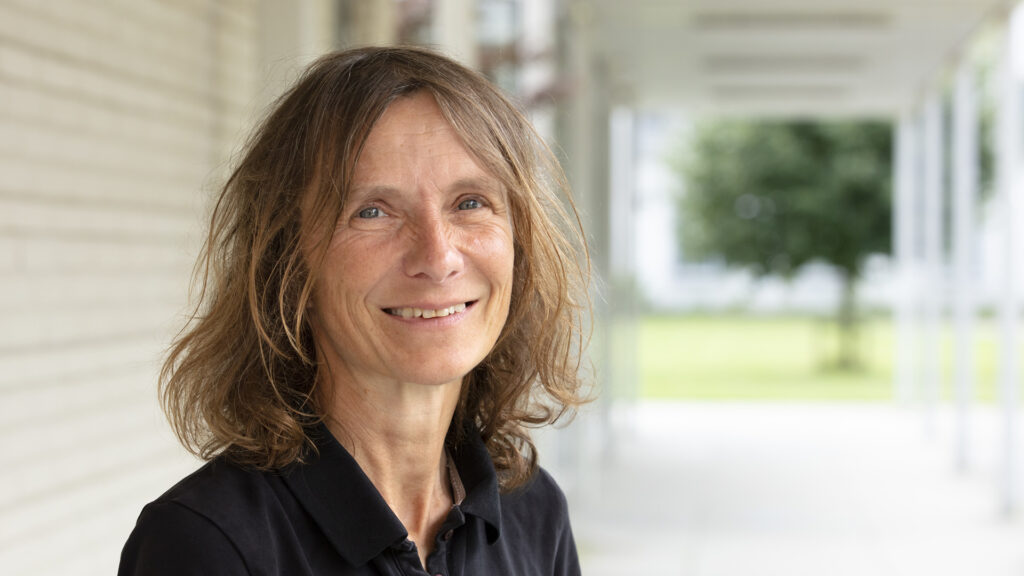
Silvia hopes that in the coming years, she will be able to enthuse even more researchers about valorisation and, above all, that those researchers will see that it is an enrichment. ‘It is a new world opening up. This also has to do with recognition: it is nice when you receive appreciation for your work from beyond the university walls. I am not saying that every researcher should valorise. But we should absolutely be able to reach out and support those who are interested in valorisation.’
Are you thinking of valorising your research? Then please contact a valorisation manager. They will put you in touch with the right people and services. More info on Pintra.


